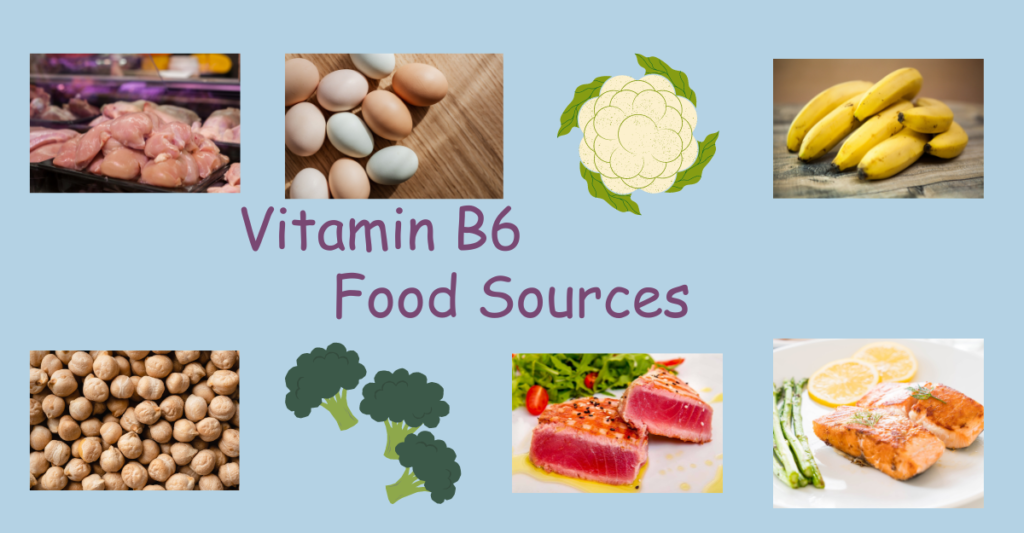Starting a pregnancy is an amazing adventure that is full of happiness, excitement, and a renewed sense of responsibility. Ensuring optimal health and well-being becomes important as expectant mothers tend to the beautiful life growing inside them. You can have a smoother and healthful pregnancy for both you and your unborn child by getting enough B vitamins through a balanced diet! Among B vitamins, vitamin B6 plays an important function in promoting a number of physiological functions. These physiological functions are necessary for a successful pregnancy. Let’s examine the effects of vitamin B6 on the health of mothers and how it relate to a successful pregnancy.
- What is Vitamin B6, and why is it important?
- Functions and Benefits of Vitamin B6
- Promoting the Development of the Fetus
- Managing Pregnancy Discomforts
- Vitamin B6-Rich Foods for Pregnancy
- How Much Vitamin B6 Should Take During My Pregnancy?
- Signs of Vitamin B6 Deficiency
- Potential Side Effects and Precautions for Vitamin B6 Supplementation
- FAQ
What is Vitamin B6, and why is it important?

Pyridoxine, or vitamin B6, is a water-soluble member of the B-complex family of vitamins. It acts as a coenzyme in more than 100 enzymatic processes related to immunological response, neurotransmitter production, and amino acid metabolism. Furthermore, it is essential for the synthesis of red blood cells and maintains the healthy operation of the brain system.
Due to the increased metabolic demands during pregnancy, a larger intake of vital nutrients is necessary to support the health of the expectant mother. Vitamin B6 is a vitality booster for moms overall, helping with everything from immune system support to macronutrient metabolism.
Functions and Benefits of Vitamin B6
The functions and benefits of Vitamin B6 extend far beyond its role as a coenzyme. Some key functions and potential benefits include:
- Metabolism Regulation: Vitamin B6 aids in the metabolism of carbohydrates, proteins, and fats, converting them into energy for cellular processes.
- Neurotransmitter Synthesis: Vitamin B6 is essential for the synthesis of neurotransmitters such as serotonin, dopamine, and GABA, which regulate mood, sleep, and cognitive function.
- Immune Support: Vitamin B6 contributes to immune function by supporting the production of antibodies and white blood cells.
- Cardiovascular Health: Vitamin B6 intake has been associated with a reduced risk of cardiovascular disease by lowering levels of homocysteine. (Homocysteine is an amino acid linked to heart disease.)
- Cognitive Function: Vitamin B6 plays a role in maintaining cognitive function. It may help reduce the risk of age-related cognitive decline.
- Nausea Relief: Vitamin B6 supplementation has been shown to alleviate pregnancy-related nausea and vomiting, providing relief to expectant mothers.
- Red Blood Cell Production: Vitamin B6 supports the production of red blood cells. It helps in preventing anemia during pregnancy and ensuring adequate oxygen transport to the developing fetus.
- Fetal Development: Vitamin B6 is essential for proper fetal brain development. It contributes to the synthesis of neurotransmitters and the formation of neural pathways.
Promoting the Development of the Fetus
A healthy diet is essential for the fetus’s optimal growth and organ production while it develops inside the womb. By aiding in the manufacture of neurotransmitters like dopamine and serotonin, which are crucial for brain development, vitamin B6 plays a major role in fetal development. Furthermore, vitamin B6 facilitates the synthesis of essential proteins required for the growth and development of fetal tissue by supporting the metabolism of amino acids.
Managing Pregnancy Discomforts
Nausea and vomiting, also known as morning sickness, can be quite challenging for expectant moms during the early stages of pregnancy. Fortunately, Vitamin B6 has emerged as a natural therapy to reduce these discomforts. According to studies, Vitamin B6 supplementation has been has been found to lower the severity of nausea and vomiting, providing relief to expectant mothers without causing unpleasant side effects.
Vitamin B6-Rich Foods for Pregnancy

Incorporating Vitamin B6-rich foods into the diet is a practical way for expectant mothers to meet their nutritional needs. Fortified ready-to-eat cereals, fish, liver and other organ meats, potatoes and other starchy vegetables, legumes, nuts, bananas, avocados, and other non-citrus fruits, egg yolks, whole grains, and vegetables are all high in total vitamin B-6.
Here are some delicious and nutritious options to consider:
- Lean Meats: Chicken breast and turkey are excellent sources of Vitamin B6. Grilled or baked, these protein-rich foods can be part of a balanced pregnancy diet.
- Legumes: Chickpeas, lentils, and black beans are not only packed with fiber and protein but also contain significant amounts of Vitamin B6. Adding legumes to salads, soups, or stir-fries can enhance both flavor and nutrient intake.
- Fish: Salmon, tuna, and trout are not only rich in Omega-3 fatty acids but also provide a healthy dose of Vitamin B6. Incorporating fish into meals twice a week can contribute to overall maternal health and fetal development.
- Whole Grains: Whole grains like oats, brown rice, and quinoa are not only filling but also contain Vitamin B6. Starting the day with a nourishing bowl of oatmeal or incorporating quinoa into salads can boost Vitamin B6 intake.
- Fruits and Vegetables: Potatoes (with skin), bananas, avocados, spinach, and bell peppers are excellent sources of Vitamin B6. Including a colorful array of fruits and vegetables in daily meals ensures a diverse nutrient profile.
Let’s include a table highlighting the dietary sources of vitamin B6:
| Food Source | Vitamin B6 Content (mg) |
| Chicken breast | 0.68 |
| Chickpeas | 1.1 |
| Salmon | 0.9 |
| Potatoes (with skin) | 0.7 |
| Bananas | 0.5 |
| Avocado | 0.4 |
How Much Vitamin B6 Should Take During My Pregnancy?
Understanding the appropriate Vitamin B6 intake is important for expectant mothers as they provide an ideal environment for their growing baby. During pregnancy, the Recommended Dietary Allowance (RDA) for Vitamin B6 rises to meet the increased metabolic needs of both the mother and the developing fetus. The National Institutes of Health (NIH) provides particular recommendations for Vitamin B6 intake during pregnancy dependent on the trimester:
- First Trimester: During the first trimester, pregnant women should consume 1.9 mg of Vitamin B6 per day, which is consistent with the RDA for the general adult population.
- Second and Third Trimesters: As pregnancy proceeds during the second and third trimesters, pregnant women’s RDA for Vitamin B6 increases slightly to 2.0 milligrams per day.
These recommended dietary amounts aim to ensure adequate Vitamin B6 availability to support numerous physiological functions that are important for maternal health and fetal development. Expectant moms must meet their increased nutritional requirements during pregnancy, including Vitamin B6, by eating a well-balanced diet high in Vitamin B6. However, supplementation may be required in some circumstances, particularly if dietary consumption is inadequate or if prescribed by the doctor.
Signs of Vitamin B6 Deficiency
While vitamin B6 deficiency is uncommon, poor diet, alcoholism, and certain conditions can increase the risk during pregnancy. Signs of Vitamin B6 deficiency may include:
- Increased nausea and vomiting
- Fatigue and weakness
- Irritability and mood changes
- Swollen tongue or mouth sores
- Anemia due to impaired hemoglobin synthesis
- Skin rashes or inflammation
- Confusion or cognitive impairment
Potential Side Effects and Precautions for Vitamin B6 Supplementation
While vitamin B6 supplementation is generally regarded safe when taken in the range of recommended dosage, excessive intake can have negative consequences. Potential side effects of high-dose Vitamin B6 supplementation may include:
- Nausea, vomiting, and abdominal pain
- Nerve damage and sensory neuropathy
- Photosensitivity and skin reactions
It is necessary to consult with your doctor before taking any Vitamin B6 supplements, especially during pregnancy, in order to confirm safety and efficacy.
FAQ
How to Incorporate More Vitamin B6 into Your Diet?
Including Vitamin B6-rich foods in your daily meals is a simple and efficient approach to increase your consumption while pregnant. Here are some useful tips for boosting Vitamin B6 levels in your diet.
- Include lean proteins such as chicken, turkey, and fish in your meals.
- Add legumes like chickpeas, lentils, and beans to salads, soups, or stews.
- Enjoy whole grains such as oats, brown rice, and quinoa as part of your meals.
- Snack on nuts and seeds like sunflower seeds, walnuts, and flaxseeds for a nutritious boost.
- Incorporate fruits like bananas and avocados into smoothies, yogurt, or oatmeal.
- Include vegetables such as spinach, potatoes, and bell peppers in your stir-fries or salads.

